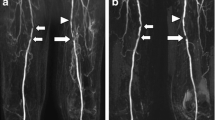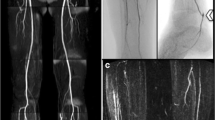Abstract
Objective
This study was to evaluate diagnostic performance of unenhanced electrocardiography-gated fast spin echo based MRA with variable flip angle on 3.0 T for assessment of calf arteries in patients with peripheral arterial occlusive disease (PAOD).
Methods
64 patients underwent unenhanced MRA (UE), time-resolved contrast-enhanced MRA of the calf and bolus-chase contrast-enhanced lower peripheral MRA (BCE). Diagnostic performance of UE was evaluated and compared with contrast-enhanced MRA in 61 patients and x-ray angiography in 10 patients.
Results
With UE, 852 of 960 segments (88.75%) were diagnostic even in patients with arrhythmia, demonstrating similar image quality with those on BCE (P > 0.05). For those diagnostic segments, statistics revealed good agreement between unenhanced and contrast-enhanced techniques with a Kappa value of 0.77 and 0.75 for stenosis detection and visualized vessel length, respectively. When using X-ray angiography as reference standard, no significant difference was found between UE and contrast-enhanced MRA concerning sensitivity and specificity in depiction of severe stenosis and occlusion (P > 0.05).
Conclusions
Although further technical refinements are required, this optimized UE technique may be used as a supplement to contrast-enhanced MRA particularly in patients with PAOD in whom venous contamination occurs frequently.





Similar content being viewed by others
References
Vogt MT, Wolfson SK, Kuller LH (1992) Lower extremity arterial disease and the aging process: a review. J Clin Epidemiol 45:529–542
Balkau B, Vray M, Eschwege E (1994) Epidemiology of peripheral arterial disease. J Cardiovasc Pharmacol 23:S8–S16
Norgren L, Hiatt WR, Dormandy JA et al (2007) Inter-society consensus for the management of peripheral arterial disease (TASC II). Eur J Vasc Endovasc Surg 33:S1–S75
Berg F, Bangard C, Bovenschulte H et al (2008) Feasibility of peripheral contrast-enhanced magnetic resonance angiography at 3.0 Tesla with a hybrid technique: comparison with digital subtraction angiography. Invest Radiol 43:642–649
Ho VB, Corse WR (2003) MR angiography of the abdominal aorta and peripheral vessels. Radiol Clin N Am 41:115–144
Ersoy H, Rybicki FJ (2003) MR angiography of the lower extremities. Am J Roentgenol 190:1675–1684
Dinter DJ, Neff KW, Visciani G et al (2009) Peripheral bolus-chase MR angiography: analysis of risk factors for nondiagnostic image quality of the calf vessels-a combined retrospective and prospective study. Am J Roentgenol 193:234–240
Zhang HL, Ho BY, Chao M et al (2004) Decreased venous contamination on 3D gadolinium-enhanced bolus chase peripheral MR angiography using thigh compression. Am J Roentgenol 183(1041–10):47
Andreisek G, Pfammatter T, Goepfert K et al (2007) Peripheral arteries in diabetic patients: standard bolus-chase and time-resolved MR angiography. Radiology 242:610–620
Zhang HL, Khilnani NM, Prince MR et al (2005) Diagnostic accuracy of time-resolved 2D projection MR angiography for symptomatic infrapopliteal arterial occlusive disease. Am J Roentgenol 184:938–947
Pereles FS, Collins JD, Carr JC et al (2006) Accuracy of stepping-table lower extremity MR angiography with dual-level bolus timing and separate calf acquisition: hybrid peripheral MR angiography. Radiology 240:283–290
Sadowski EA, Bennett LK, Chan MR et al (2007) Nephrogenic systemic fibrosis: risk factors and incidence estimation. Radiology 243:148–157
Hoppe H, Spagnuolo S, Froehlich JM et al (2010) Retrospective analysis of patients for development of nephrogenic systemic fibrosis following conventional angiography using gadolinium-based contrast agents. Eur Radiol 20:595–603
O’Hare AM, Bertenthal D, Shlipak MG et al (2005) Impact of renal insufficiency on mortality in advanced lower extremity peripheral arterial disease. J Am Soc Nephrol 16:514–519
Miyazaki M, Takai H, Sugiura S et al (2003) Peripheral MR angiography: separation of arteries from veins with flow-spoiled gradient pulses in electrocardiography-triggered three-dimensional half-fourier fast spin-echo imaging. Radiology 227:890–896
Lim RP, Hecht EM, Xu J et al (2008) 3D nongadolinium-enhanced ECG-gated MRA of the distal lower extremities: preliminary clinical experience. J Magn Reson Imaging 28:181–189
Xu J, Weale P, Laub G et al (2008) A novel noncontrast MR angiography technique using triggered non-selective refocused SPACE for improved spatial resolution and speed. Proc Intl Soc Mag Reson Med 16:730
Lim RP, Storey P, Atanasova IP et al (2009) Three-dimensional electrocardiographically gated variable flip angle FSE imaging for MR angiography of the hands at 3.0 T: initial experience. Radiology 252:874–881
Kramer H, Michaely HJ, Matschl V et al (2007) High-resolution magnetic resonance angiography of the lower extremities with a dedicated 36-element matrix coil at 3 Tesla. Invest Radiol 42:477–483
Likert R (1932) A technique for the measurement of attitudes. Arch Psychol 140:1–55
Herborn CU, Watkins DM, Runge VM et al (2006) Renal arteries: comparison of steady-state free precession MR angiography and contrast-enhanced MR angiography. Radiology 239:263–268
McCauley TR, Monib A, Dickey KW et al (1994) Peripheral vascular occlusive disease: accuracy and reliability of time-of-flight MR angiography. Radiology 192:351–357
Hahn WY, Hecht EM, Friedman B et al (2007) Distal lower extremity imaging: prospective comparison of 2-dimensional time of flight, 3-dimensional time-resolved contrast-enhanced magnetic resonance angiography, and 3-dimensional bolus chase contrast-enhanced magnetic resonance angiography. J Comput Assist Tomogr 31:29–36
Chang KJ, Kamel IR, Macura KJ et al (2008) 3.0-T MR imaging of the abdomen: comparison with 1.5 T. Radiographics 28:1983–1998
Xu J, Oesingmann N, Stemmer A et al (2006) Reduced acquisition window with parallel technique improves non contrast 3D HASTE MRA imaging. Proc Intl Soc Mag Reson Med 14:1931
Chen Q, Quijano CV, Mai VM et al (2004) On improving temporal and spatial resolution of 3D contrast-enhanced body MR angiography with parallel imaging. Radiology 231:893–899
Griswold MA, Jakob PM, Heidemann RM et al (2002) Generalized autocalibrating partially parallel acqusitions (GRAPPA). Magn Reson Med 47:1202–1210
Priatna A, Foster G, Xu J et al (2009) NATIVE SPACE angiography with MTC and fat saturation pulses. Proc Intl Soc Mag Reson Med 17:593
Arizono S, Isoda H, Maetani YS et al (2008) High-spatial-resolution three-dimensional MR cholangiography using a high-sampling-efficiency technique (SPACE) at 3 T: comparison with the conventional constant flip angle sequence in healthy volunteers. J Magn Reson Imaging 28:685–690
Author information
Authors and Affiliations
Corresponding author
Rights and permissions
About this article
Cite this article
Li, D., Lin, J., Yan, F. et al. Unenhanced calf MR angiography at 3.0 T using electrocardiography-gated partial-fourier fast spin echo imaging with variable flip angle. Eur Radiol 21, 1311–1322 (2011). https://doi.org/10.1007/s00330-010-2028-8
Received:
Revised:
Accepted:
Published:
Issue Date:
DOI: https://doi.org/10.1007/s00330-010-2028-8




